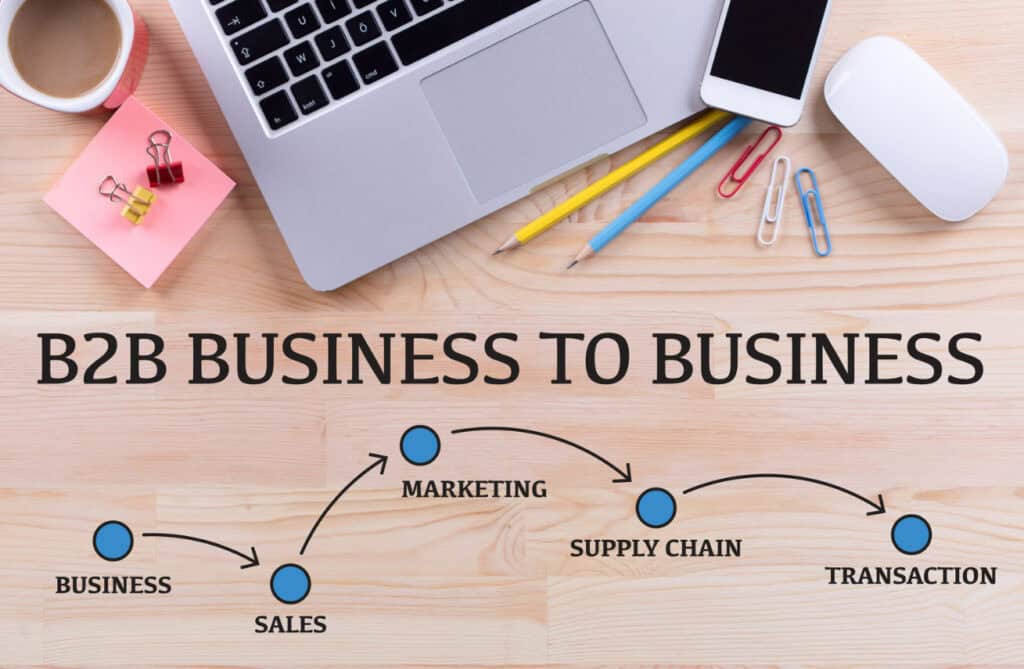In today’s dynamic business ecosystem, startups face a critical challenge: mastering B2B sales. The digital age has revolutionized how companies engage, negotiate, and close deals, rendering traditional approaches obsolete.
Table of Contents
For nascent enterprises, achieving excellence in B2B sales is favorable and imperative for their survival and expansion. The modern sales landscape demands a sophisticated blend of technological prowess and deep customer insight.
As markets grow increasingly competitive and buyer expectations evolve, startups must swiftly adapt their sales strategies or risk obsolescence. By embracing innovative B2B sales techniques, new companies can effectively compete with established players, laying the groundwork for sustainable success.

This blog post provides a strategic plan for entrepreneurs to negotiate the intricate landscape of B2B sales. It aims to provide actionable strategies to conquer challenges and drive exponential growth.
Understanding Your Ideal Customer
For startups, creating detailed buyer personas is crucial for B2B sales success. This process involves developing comprehensive profiles of your target customers, encompassing their industry, company size, needs, and decision-making processes.
Begin by identifying which sectors stand to benefit most from your offering. What kind of startups are you targeting? Analyze their specific pain points—what issues keep them awake at night?
Understand their decision-making hierarchy: who influences purchases, and what information do they prioritize? Analyze financial statements, market research, and consumer comments to obtain important insights.

Experts at Prolifiq stress that this comprehensive study reveals the revenue potential of the account, successfully leading your strategic efforts. Effective opportunity management necessitates having a thorough understanding of your target customer.
Craft detailed profiles of your ideal customers, including specific job titles and hypothetical names. For example, “Sarah, the IT Director at a mid-sized healthcare company” is your target persona.
This level of detail helps you visualize your target audience more clearly. It enables you to tailor your messaging and sales approach to address their unique challenges and needs. Remember, the goal is to address their underlying concerns, positioning your startup as the solution they’ve been seeking.
Leveraging Content Marketing on a Budget
Content marketing is an influential and economical method that companies may use to draw in potential customers and establish brand recognition. It enables you to demonstrate your expertise, educate clients about your offers, and establish yourself as a leader in your field.
Direct your attention towards producing superior, customer-focused content—a strategy embraced by 88% of prosperous organizations. This approach prioritizes addressing customer needs over overt sales pitches. Develop content that aligns with the information your target audience actively seeks.
Startups can communicate their message through informative blog posts, incisive white papers, engaging infographics, and thought-provoking videos. These mediums allow you to demonstrate your industry knowledge while providing value to potential clients.
Remember, consistency is key. Regular, valuable content positions your startup as a trusted resource in your field. It fosters long-term relationships with your audience and paves the way for successful B2B sales engagements.
Smart Account Planning for Limited Resources
For startups with constrained resources, efficient account planning is crucial. A study mentioned in Forbes found that customer experience reigns supreme. Over 70% of consumers prioritize speed, convenience, and friendly service.
In addition, even just one negative experience can cause many customers to discontinue their support for a brand they are fond of. Customer satisfaction plays a crucial role in determining the success of a business, as highlighted by these statistics.
Customer Relationship Management (CRM) systems offer a powerful solution. These platforms consolidate customer data into a centralized repository, enabling seamless collaboration across departments.
This integration is especially crucial for startups, as team members frequently assume several roles. When approaching account planning, you must choose between buyer-centric and company-centric strategies.
The buyer-centric approach focuses on identifying key decision-makers within target companies, making it ideal for startups with niche offerings. Conversely, the company-centric method targets broader market segments, suitable for startups exploring diverse industries.
Cross-team collaboration is paramount in growing businesses like yours. The individual spearheading account planning should possess in-depth product knowledge, translating it into tailored strategies for high-value accounts.
For optimal results, sales and marketing teams must work in tandem, defining decision-making roles throughout the sales process. By leveraging CRM tools and adopting a strategic approach to account planning, your startup can maximize its limited resources.
Moreover, it can be empowered to foster stronger customer relationships and drive growth in the competitive B2B landscape.
Cultivating Open Communication Channels
In the B2B ecosystem, establishing a robust communication infrastructure is paramount. This framework should facilitate seamless interactions between your team and clients, setting clear expectations from the project’s inception. Such clarity mitigates the risk of eleventh-hour complications and misinterpretations.
Implementing systematic progress updates and periodic check-ins lays the groundwork for transparent dialogue. This continuous exchange ensures alignment on objectives, facilitates performance evaluation, and enables swift responses to emerging challenges.
The digital revolution has ushered in a plethora of communication tools. They enable effective collaboration even when physical meetings are impractical. Forbes states that video conferencing platforms have emerged as indispensable assets. They can bridge geographical divides and maintain uninterrupted partnerships.
These sophisticated tools offer an array of collaborative features, including real-time document annotation, screen sharing, and focused breakout sessions. Integrated messaging functions and interactive elements enhance participant engagement and facilitate immediate feedback.
Likewise, project management software optimizes workflow efficiency, enabling teams to track critical milestones and enhance overall synergy. These digital solutions provide a centralized platform for task allocation, progress monitoring, and resource management.
In the B2B sales arena, active listening has become increasingly crucial. This skill demands concentrated effort to absorb, process, and retain shared information. Mastering this ability fosters deeper understanding and strengthens client relationships.
Ultimately, effective communication transcends mere information dissemination. It creates a harmonious ecosystem where ideas flourish and mutual understanding thrives, driving successful B2B partnerships.
Forging Lasting Business Relationships for Success
For startups navigating the B2B landscape, building enduring partnerships is crucial. Integrity forms the foundation of these relationships. Consistently meeting deadlines and fulfilling commitments establishes your startup as a reliable partner, paving the way for future collaborations.
Implementing a code of ethics, even for small teams, sets a strong precedent. Financial experts emphasize that professional integrity stems from these ethical guidelines.
For startups, such codes should outline core values, problem-solving approaches, and behavioral standards tailored to your unique business model.
To truly connect with B2B clients, immerse yourself in their business challenges. Celebrate their milestones, both privately and publicly. This genuine investment demonstrates your startup’s commitment to its success, aligning your growth with theirs.
Consider creating loyalty programs that reward long-term partnerships. These initiatives should be thoughtfully designed to express sincere appreciation without appearing manipulative. Remember, authenticity is key for startups; superficial gestures can damage hard-earned trust.
Explore opportunities for collaborative projects that foster mutual growth. By aligning objectives with your B2B clients, you create symbiotic relationships that transcend typical vendor-client dynamics.
In the competitive startup ecosystem, a client-centric approach is indispensable for expanding your B2B clientele. Leverage technological advancements, such as AI-driven CRM systems, to enhance your client service capabilities. These tools enable startups to offer personalized experiences that rival those of larger competitors.

Conquering B2B Sales – FAQs
Q: How can startups compete with established B2B companies?
A: Startups can compete by leveraging their agility, focusing on niche markets, and utilizing cost-effective digital marketing strategies. By understanding their ideal customers and offering innovative solutions to specific pain points, startups can carve out their unique space in the B2B landscape.
Q: What role does technology play in modern B2B sales for startups?
A: Technology is crucial in modern B2B sales. CRM systems help manage customer data, while video conferencing tools facilitate remote meetings. AI-driven analytics can provide insights into customer behavior. Moreover, the automation tools can streamline sales processes, allowing startups to operate more efficiently.
Q: How important is content marketing for B2B startups?
A: Content marketing is vital for B2B startups. It helps establish thought leadership, build brand awareness, and attract potential customers cost-effectively. By creating valuable, customer-centric content, startups can educate their audience, nurture leads, and foster long-term client relationships.
Conquering B2B sales is not just about closing deals; it’s about revolutionizing how startups approach business relationships. By leveraging technology and prioritizing customer-centricity, startups can survive and thrive in the competitive B2B landscape.
This approach transforms challenges into opportunities, enabling new ventures to disrupt industries and scale rapidly. Ultimately, mastering B2B sales becomes a catalyst for startup success. It drives sustainable growth and fosters innovation in the ever-evolving business world.



